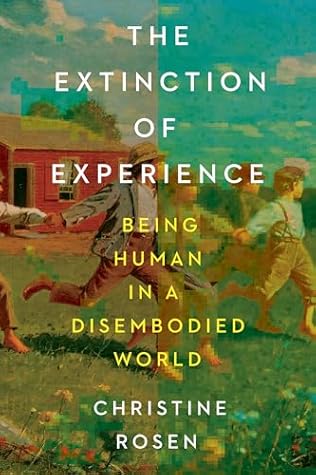More on this book
Community
Kindle Notes & Highlights
Read between
September 27 - October 14, 2024
Our understanding of experience has become disordered, in ways large and small. More and more people mistrust their own experiences. More and more people create their own realities rather than live in the world around them. We can no longer assume that reality is a matter of consensus.
Today, many of us choose to live in a form of pseudo-reality governed by algorithmically-enabled individual experiences. Much of what passes for authentic experience today is vicarious and virtual.
What do we gain and what do we lose when we no longer talk about the Human Condition, but rather the User Experience?
The human condition is embodied, recognizes its fragility, frequently toggles between the mediated and unmediated, requires private spaces, and is finite. By contrast, the User Experience is disembodied and digital, it is trackable and databased and usually always mediated. It lacks privacy and promises no limits—even after death, when, as several new technologies promise, our digital remnants can be gathered and engineered into posthumous chatbots to comfort our grieving family members.
Digital technology shapes expectations on a greater scale and with more power than TV ever could. While broadcast television commercials were bound to a predetermined schedule, social media platforms feed users carefully tailored streams of information meant to nudge their behavior in real time. This makes digital technology a far more aggressive tool to shape decision-making. Features that make digital technology appealing—responsiveness and precision—can impact our sense of agency.
If earlier technologies were an extension of our senses, today’s technologies train us to mistrust our own senses and rely instead on technology.
This book is a modest effort to encourage us to cultivate and, in some cases, recover ways of thinking, knowing, and being in the world that we are losing or have lost through our embrace of mediating technologies.
What we reject, as we will see, are the inconveniences and small hazards of face-to-face communication, the laborious but necessary practice of doing things with our own hands, and the non-quantifiable experience of unmediated pleasure.
We need to defend the sensory world and remind ourselves of the crucial importance of the physical body, the integrity of physical space, and the need for people to cultivate inner lives. From these flow things that can’t be made by machines: serendipity, intuition, community, spontaneity, and empathy.
The group with improved handwriting had enhanced word recognition and reading skills, better memory of what they had worked on, and were more successful in expressing ideas. More importantly, the students who focused on handwriting reported enjoying learning more. “Handwriting is not just a motor process,” the study concluded. “It is also a memory process for letters—the building blocks of written language.”
Patricia Kuhl of the Institute for Learning and Brain Sciences at the University of Washington wanted to answer several questions: At what age do babies recognize their parents’ or caregivers’ native language? How open are they to the tones and tempo of a different language? At what developmental stage do their brains become efficient at storing language? Kuhl performed a series of experiments on infants that involved the children sitting in a parent’s lap and listening to them talk while tracking the infants’ head movements and, in some cases, images of their brains using
...more
Kuhl also tested whether it would make a difference if the babies heard words directly from a human being or from an audio recording or video. She and her colleagues reran their experiments using a television set rather than a human being, then ran them again with only an audio recording. “What you see here is the audio result—no learning whatsoever—and the video result—no learning whatsoever,” she told an audience at a TEDx conference. Her conclusion would seem obvious, and yet, given the amount of time young children spend with screens today and how often one sees parents staring raptly at
...more
Behavioral psychologist B. F. Skinner urged the adoption of “teaching machines” to eliminate classroom inefficiencies in his 1968 book The Technology of Teaching.
Some of our disappearing habits, such as handwriting and drawing, might not seem important. They are modest skills whose benefits are experienced privately, cannot easily be monetized (unless you are that rare thing, a professional calligrapher), and whose use in daily life no longer makes sense for an increasing number of people.
Yet the quiet disappearance of handwriting from our lives shows how the extinction of certain experiences happens: experiences recede gradually, not through some top-down edict or bottom-up populist campaign. And we rationalize their obsolescence not as a loss but as another mark of progress and improvement. A skill fades, and with it a human experience that spans millennia.
to learn.


